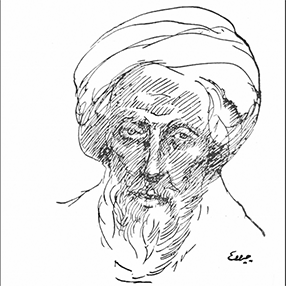From the “Khamriyyah”
translated from the Arabic by Leonard Chalmers-Hunt
xxiv
They are not wisest who are conscious most
That without worldly power, life’s end is lost,
Let lisping lips be offered by a child,
The heart with Wisdom would be reconciled.
xxv
Sometimes when in the city’s marketplace
I’ve chanced to greet a friend’s familiar face,
Where the white mosque o’er those who sell and buy
Lifts shining minarets to meet the sky.
xxvi
When questioned oft by folk incredulous,
My answers they’ve rebuked as nebulous.
“Tell us,” said they, “the secrets of a wine
Which warms the heart, and makes the eye to shine!”
xxvii
Not of fermented wine that Vision clear!
Soft as the morn! but not of atmosphere!
Bright as Arabia’s Sun! but not of fire.
Spirit of Beauty! drawing nigh and nigher.
xxviii
It “is”! and “was,” and brooded o’er the deep
Till Thought and Purpose caused the void to leap
When Time and Space were not, but a great Calm
Profound Solemnity!—and then Life’s Balm.
xxix
Forth at a “Word” inscrutable in Might,
Created worlds rolled onward thro’ the night.
Dwelling alone, some wiser Law to teach,
Veiled from all things, yet immanent in each!
xxx
O, the desire of my toil-stainèd soul!
To rest beneath what seems an endless goal,
To breathe new life, nor doubtfully despond
Of clasping yet once more friends gone beyond!
xxxi
For Time’s a thought of space, which men call years,
Fulfilled, when Love shall dry the mourner’s tears,
From seed to blade, from blade to ripen’d sheaf,
No parting is; with one who shareth grief!
xxxii
Would I might feel that Sense, which strengthens sight
Which teacheth simple hearts to praise aright,
Then heart would join with lips at shadow-fall
And frail hands stretch to One who loveth all!
xxxiii
So rich in virtue is that gracious Wine!
That one who knoweth not Its name Divine
Should but hear it, ne’er would be afraid
To speak his love, e’en as a man to maid.
xxxiv
He who fills oft the Cup of mortal fire,
Drinks to himself unquenchable desire!
But he who hearkens to the Seer’s advice,
Tastes the ripe Vintage of Its Paradise!
This poem is in the public domain. Published in Poem-a-Day on April 16, 2023, by the Academy of American Poets.
The “Khamriyyah” appears in Leonard Chalmers-Hunt’s The “Khamriyyah” (Wine Song) of Umar Ibn al-Fārid and Other Arabic Poems (Simpkin, Marshall, Hamilton, Kent and Co., 1923). The Arabic original was written sometime during the life of Ibn al-Fāriḍ, between the years 1181–1235. In Islamic Thought and the Art of Translation (Brill, 2022), Marlene DuBois, assistant department chair of English and humanities at Suffolk County Community College, recounting medieval Sunni scholar Jāmī’s interpretation of “The Wine Song” in his treatise the Lawāmiʿ, writes, “The speaker and his friends were drunk with this wine before creation even occurred. It is an other-worldly vintage whose qualities can only be pointed to by the earthly vintage and by the words of the poet. In mythic language, the wine might be called a primordial wine, a wine that existed (and exists) beyond time. [. . .] According to Jāmī, Ibn al-Fāriḍ’s poem is about awakening to reality [. . .] and the eventual immersion in what is truly Real. [. . .] Corporeal reality—handsome men and women, wine, and gardens—are all things that point to what is beyond them; they are only likenesses of what is truly Real. [. . .] If every corporeal thing is God’s self-manifestation [. . .] every existent thing is a kind of metaphor.”

